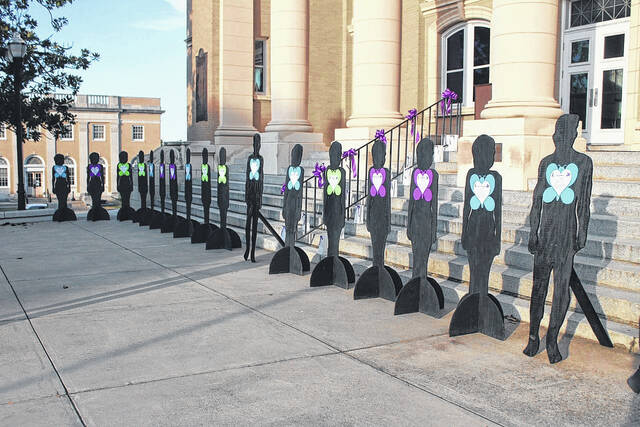
“During the vigil we display what we call silent witnesses which are wooden silhouettes of victims who died due to domestic violence in Anson County and have a short program including family and victim statements and a presentation to local law and enforcement and organizations for supporting the agency,” said Kimberly Liles, a victim advocate of 12 years at the Anson County Domestic Violence Coalition, about last year’s vigil.
WADESBORO — October is Domestic Violence Awareness Month (DVAM), also known as Intimate Partner Violence. Domestic violence is a serious issue facing many men and women across the country. A crime historically believed to disproportionately affect women, men also face abuse from their significant other. October 20 is Wear Purple Day, a day everyone is encouraged to wear purple in honor of both victims and survivors.
Anson will be holding their annual Domestic Violence Awareness Vigil on October 26 at 6 p.m. In a new location this year, the vigil will be held in front of the Anson County Domestic Violence Coalition.
Domestic Awareness Month stems from the “Day of Unity” established in October 1981, created by the National Coalition Against Domestic Violence. The first DVAM observed was in October 1987, followed by the first national domestic violence toll-free hotline, that same year.
Domestic violence is a pattern of controlling behavior that can include physical, mental, financial, and emotional abuse. Bringing awareness to the issue relieves some of the stigma victims feel they face. It can often be difficult to admit you are in a situation you feel helpless to escape. Many look askance at victims, questioning their intelligence for staying in an abusive relationship. Other factors to be considered are where a victim can go for shelter when they do get the courage to leave. Sometimes survivors are stalked after escaping, perpetuating the abuse and fear. Victims need to be aware that their abuser may track them online, using technology to narrow down their location or monitor their victim’s online activities. Leaving the abusive situation can anger the abuser, leading to an escalation of the violence.
Survivors may feel trapped by their love for their abuser, as domestic violence typically occurs gradually, with the abuser appearing charming in the beginning. This charming act helps further isolate the victim as from the outside it may appear that they are making up the abuse. It can be hard to admit to others that they are being abused, to admit their relationship has failed. Violence begets violence and many victims survive an abusive childhood only to be a target of an abuser as an adult, making it challenging to believe that they do not deserve the abuse.
Scars from domestic violence remain tattooed on the victim’s heart and mind. The words of their abuser may repeat in their heads, becoming an insidious mantra that no outward sound could ever be loud enough to drown out. Even years after escaping the violence, victims may still hear the drumbeat of self-doubt banging in their ears. Scars of the heart affect a survivor’s ability to love another or relate to others. It is even worse when their abuse is considered “baggage” by future relationships. For many survivors mental and emotional abuse is tougher to heal from than physical violence.
Abusers often use financial means to isolate and control their victims. They may run up large debts in the name of their victim, sometimes coercing them to transfer all their income into the abuser’s bank account.
Isolation is an integral part of the abuser’s playbook, allowing the abuser to control whom their victim interacts with and the resources available to them. Abusers berate their victim for imagined faults, blaming them for their own actions and humiliating the victim in front of family and friends. The latter serves as another way of further isolating their victim.
Statistics indicate there are more than ten million abuse victims annually; 1 in 3 women and 1 in 4 men have been physically abused by a romantic partner. Approximately 20% of survivors will suffer new psychiatric disorders, such as major depressive disorder or post-traumatic stress disorders, in addition to a wide-range of substance abuse problems. There are a lot of reasons why victims feel incapable of leaving such as; chronic illness, religious beliefs, fear of retaliation by their abuser, fears of not being believed or losing custody of their children or pets, and loss of their home and financial stability.
Chronic illness is especially challenging as stress makes chronic illnesses worse, leading to a victim feeling too ill to leave, or concern over how and where they will receive medical care when they make the decision to leave.
There are typically warning signs in a relationship of the abuse to come. Often abusers will move quickly into the relationship, showering their target with so much love and affection that it may seem too good to be true. They may insist that the victim spend time with them over family and friends and may become jealous and controlling little by little. Abusers often criticize their partner’s appearance, such as weight or intelligence, convincing them they cannot find anyone else, that they are unlovable. Before long the victim will doubt their self worth, begin to see everything as being their fault, leading to the victim justifying their abuse.
Shelters can be the only option some victims have which can lead to fear of losing personal freedom if the abuse is reported. Shelters provide a roof over their heads, sometimes even legal advice. Through the Purple Leash Project, sponsored by Purina, more pet-friendly shelters for survivors of domestic violence are being created around the country.
Another avenue for help is the National Domestic Violence Hotline, 800-799-7233, or you can text 88788 if you or someone you know is a victim of domestic violence. The hotline offers professionals who are trained to assist callers with education, safety planning, help victims gets in touch with local shelters and programs, and provide assistance with legal and financial aid.
Reach Lauren Monica at (704) 994-5471 or lmonica@ansonrecord.com



